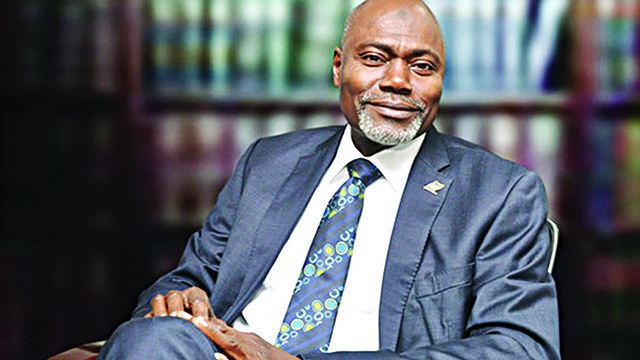
Mallam Yusuf Olaolu Ali, (SAN) was called to the Nigerian Bar in 1983. In this interview with OLUGBENGA SOYELE, the lawyer, who is also the Pro-Chancellor and Chairman of Council, Osun State University, speaks on the administration of justice, the security crisis in the country and other national issues.
The President of the Nigerian Bar Association (NBA) recently said that some judges in the country are now cowed and afraid to stand independently. Do you share this opinion?
It is a perception and it is clear that you either don’t see the things that are supposed to operate or they are not even there. Apart from judicial integrity you also need judicial courage because you must have courage to express your convictions. The President has his reasons for saying such and being the President of all lawyers in Nigeria, he is open to all shades of opinions, views and pieces of information which may not be available to people like us. We are just individuals so I want to believe that he has valid reasons for saying that judicial courage appears to be lacking in our judges but you see, there is lack of courage in every facet of our lives. In the good old days when people hear the sound of thieves in their houses they would come out to defend and protect their neighbours but now when such happens everybody would take to their heels so that tells you where we’re coming from. It is symptomatic of the problem we have as a country.
Could that also amount to the same thing for lawyers? Is that how lawyers also feel intimidated?
Generally, I don’t think we are because the only thing we can do is to speak out, and I think we’ve been speaking out. It’s only few people that would really speak out in any society. For me, I think that the best thing we can do as lawyers is to speak out against or in favour of anything we feel strongly about and I think we’ve been doing our piece in that regard. But it would have been better if we had more people who know the exact direction our country should go and are also ready to offer opinions about it.
You are a very busy lawyer, always moving across the different states of Nigeria. As you journey around, do you feel safe?
I have said it before both publicly and privately that the level of insecurity in our country now is not only alarming, it is also unbelievable. You can hardly sleep now with your two eyes closed and you can hardly traverse the roads now without your heart pumping faster on occasions and I think the problem if not addressed in due time, has the tendency of degenerating to a state of lawlessness. Quite honestly, our country is not safe. As you’ve rightly said, we go around all the time doing what we’ve been trained to do in the interest of us all but the insecurity stares you starkly in the face and this shows that things are not the way they ought to be.
Recently, there has been a spate of killings attributed to the Fulani herdsmen and the federal government came up with the idea of Ruga settlements. Do you really think it will work for this country?
If you’re looking at symptoms and you don’t look at the root cause, there is a problem. ‘Why are we where we are’, I think should be the starting point. You can’t offer palliatives to a person with a terminal disease; palliatives can never solve the problem of a terminally ill person. I think I will just stop there.
What then is the way forward? How do we keep the patient alive?
The way forward is to ensure first of all that we have a correct diagnosis of what the problem is, before we start to apply medication. I delivered a paper in KWASU (Kwara State University) about a year ago about this herdsmen issue and I said look, we all grew up in this country, we all knew that the highest thing the ordinary herdsman would hold would be a cutlass but now we suddenly have herdsmen carrying AK47. You see, we are fixated people; once we see that a problem is caused by something, we hardly take out time to do proper investigation or inquiries as to why and whether it is the same problem or another one. I think we should dig deeper as to what is going on.
In your own opinion, what are the things causing these problems and what can you prescribe as the way forward?
High levels of unemployment, illiteracy and ignorance are a problem. Exacerbation of divisive things ethnic, religious and economic wise is also a problem. The followers look up to their leaders so when they see that their leaders are insincere; they believe they don’t have an obligation to be patriotic. So there are a lot of issues surrounding all the problems confronting our country and they must be properly addressed. When there are able bodied men who believe that there is no future, a hopeless person can do just anything. A lot of Nigerians are hopeless and when you are hopeless, nothing counts for anything to you, not even human lives. So we must take a holistic view of all these things, do a thorough identification of what the issues are, and then proceed to proffer solutions. Something as simple as the supply of electricity has a lot to do with security as well as a lot of security implications. A well-lit street is not likely to harbour miscreants but a dark place is a good place for men who plot evil to hide.
Bringing it to the justice system, would you say you are satisfied with the state of our Administration of Justice system? Does it meet your expectation?
Human progress only comes when you challenge the status quo. It is because Nigerians are satisfied with the status quo that our country is not progressing. There is always room for improvement in any human scene, including in the Administration of Justice because this is not the best system we can have; I think we can do better.
With the kind of news that has been coming out from the judiciary, it seems as if the integrity of the judiciary has gone down even in the eyes of the people. How does it make you the practitioners feel?
It is depressing because you see, for some of us who believe that cases should be won or lost on the basis of facts and law, it is depressing to hear that something other than that contributes to the winning or losing of cases. It should be a source of real concern for people who still have some modicum of integrity but till tomorrow, I won’t change in my way of holding tenaciously the view that only law and facts should determine cases in our courts. That is what I believe in, that is what I’ve been doing and that is what I will do till the end of time.
Do you actually believe accusations against some lawyers or judges that they engage in bribery?
Look, lawyers whether at the Bench or the Bar, are only a fraction of the larger Nigerian society so they cannot be isolated from the general problems that afflict our country. It is not every person that can have the strong armor of integrity and use it to live his/her life. Those who have weaker minds would fall for just anything. That is why I said individuals will have to make up their minds on the way they want to live and the way they want to be remembered.
What advice do you have for Nigerians and the Government?
Let’s restore all the good things of the past that made the rest of the world to respect us like hard work, integrity, honesty, good neighbourliness and empathy. These are things that our forebears had and the world respected them for. Let’s do less or do away with the worship of materialism, less of undermining institutions, less of the “me and my family alone” mentality. Let us know that if you or members of your family are well fed and go to bed satisfied and your neighbours are hungry, you are in danger.The constitution is not the problem, we are. The one we have presently, has it not been practiced in America for 254 years? We are just not serious with it and if we go back to 1963 constitution we’re going back to the same problem. When we practiced it in 1963 we couldn’t sustain it, and we left it. Our problem is not with constitution, it is we the people. Britain has no written constitution and their society has been prospering for centuries so what are we talking about? As a people we just have our problem and I think we need to address it.
Nigeria is the only country I know where corruption has ethnicity and religion. If a Yoruba man accuses a non-Yoruba person of being corrupt, it is strictly in the prism of tribalism. If a Christian says a Muslim is corrupt it is immediately seen as a religious issue. We leave the substance and pursue the shadow. Nobody will ever try to look into the allegation and see if it is likely to be true. No, we would rather focus on who says it and not on what he has said. So this is our country and if we don’t change, it is quite unfortunate.
When people even say we’ll pray to God. I hold the view that God doesn’t have time for unserious people like us. He is busy attending to serious people elsewhere. These are problems that God himself has given us brains to solve so why should we still be saying it is God? If a person steals in America or the UK nobody says “God will catch him”. God won’t catch anybody because he has given you the brain to go and work and solve it. This kidnapping issue for example, I have said it that we shouldn’t be wasting time. Let us deploy drones with the capacity to take photographs and there would be a control center somewhere so that the pictures taken are transmitted immediately. That way if there is a crisis we would know better how to handle it but we still believe when there is crises we send the police to mount roadblocks everywhere whereas right behind them something else would be happening. The world has gone far beyond this Stone Age and amateur security manoeuvring.
When someone steals in the US how are they caught? It is the CCTV. The CCTV we have in Abuja which has not been functioning, nobody has ever asked questions on who did those things that are not working or on how much of our money had been swept into it. No questions are asked, we just behave as if nothing has gone wrong. So with that kind of problem do you think it would amount to anything tangible for one to start making noise about it when nobody listens?

